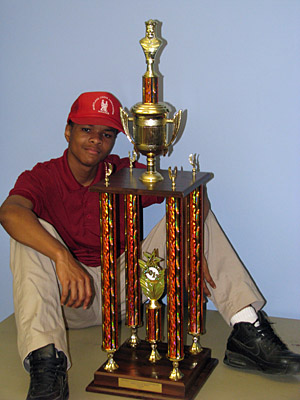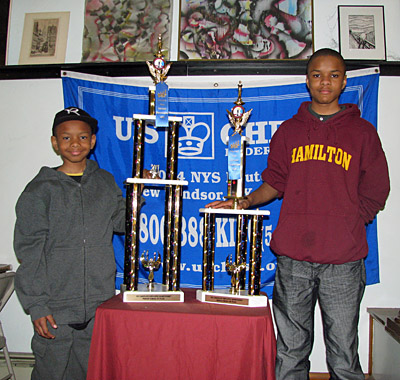Bringing out the Best in Maryland
Julius Wade, Vice President of the Maryland Chess Association, submitted this press release.
THE BEST OF TWO TITLES
When talking about black chess players in Baltimore City, you often hear about the Baltimore chess legends such as Charles Covington and William Morrison…
Not since the Scholastic Chess Dominance of such great ones like Nathan Wilson, Troy Williams, Kimani A. Stancil and Antoine Hutchinson has there ever been such a buzz in the air for Scholastic Chess in Baltimore City brought on by 13-year old Ronald Best, Jr.

Ronald Best, Jr.
Under the guidance of his father and coach Mr. Julius A. Wade Jr., Ronald has been winning countless awards and tournaments in Maryland. Recently, Ronald captured the title of “Maryland Middle School State INDIVIDUAL Chess Champion”.
This title has been elusive from Baltimore Scholastic players for over two decades! Along with this title, Ronald led his school to win the ” Maryland MIDDLE SCHOOL State Chess Championship”. Winning two titles in one weekend was a great accomplishment for Ronald.
Last year, Ronald watched as his younger brother, Jordan Best, become the first to win the “INDIVIDUAL” state title for the Primary School Division.
In the midst of all the Inner City distractions that many Baltimore teens face, Ronald has maintained focus and continues to inspire many Baltimore Scholastic Chess players with his chess skill. No matter what Baltimore public school you visit, if there is a chess program there, Ronald’s game play is mentioned. Ronald can be seen in a short documentary filmed by the Baltimore Educational Channel 77, describing some of his accomplishments.

Jordan and Ronald Best, Jr. showing their trophies.
Ronald sharpens his chess skills at the Fells Point Chess Club where he is being mentored by the club’s proprietor, Senior Tournament Director, Wilbert Brown. His current rating is 1850. Some people say that Ronald’s actual rating hasn’t caught up with him as of yet. But, when you ask him, “what is your rating?”, He simply replies, “ratings don’t matter”.
Ronald desires to be a doctor as well as a grandmaster in chess.
Submitted by,
Mr. Julius A.Wade Jr.
Vice President of The Maryland Chess Association
club development
www.mdchess.org

Hello Daaim, Please consider my kindly disagreement. First, I like this young man attitude that ratings don’t matter especially since I believe that he wants “to be” and “to beat” the best. Can you really put a rating on that kind of desire? Secondly, respecting his African-American heritage, the issue may be one of cultural diversion. His epistemic or cognitive knowledge appear to be grounded in African related symbolic imagery (being the best) vs. a euro-centric perspective grounded in a quantative assessment through counting and measuring (ratings). I like the fact that he is setting no numeric limits on what he believe is his unlimited talents. The best thing about young Ronald Best approach it that it keeps his opponents guessing or in fear of his unlimited talents!!!
Congratulations to Ronald Best, Jordan Best, Julius A. Wade Jr. and family! I write to also encourage that if it is at all possible and only if this has not yet occurred that Mr. Wade attempt to bridge a healthy relationship with a highly skilled, nurturing, and well-rounded player who can be encouraging and knowledgeable in helping these young brothers to make the jump to competing to win the open or GM level events.
I do agree with the fact that rating does not determine who will
win a chess game only who is likely too in the abscence of complete information. However, Daaim’s point is well taken especially since there are several other whiz kids like the Best’s whose higher ratings don’t simply highlight their estimated strength but also their
exposure to consistently strong opposition. Alternatively, the role of the rating as a scholarship metric is useful but I believe that the Best brothers as at least stated by their father to me some years ago are also strong in academics. If this is still the case, the issue of rating may boil down to priorities, however the issue of chess achievement will be determined by adaptability combined with chess strength in high level tourneys. Lets say that Dr. Best arrives
at a tournament and does his BEST and bests all opposition. This may be a dream to many but it is substantial nonetheless, at least in my humble opinion….
One genius to another..keep striving Brothers Best and Baba Wade Jr.
Peace,
Kimani A. Stancil
P.S. Correction Needed – Mr. Antoine Hutchinson is a strong player from Baltimore but he was not a scholastic chess phenom. Scholastically, he was strong in track, athletics, and academics.
Please add for consideration/context – Mr. Brian Richardson who preceded me in age. His contact and what I consider a living legacy was invaluable to me when I began competitive chess in 10th grade!
Peace and Blessings! Stay strong and keep up the great work! Lead by example! Diamond says hi!
I had a chance to talk with Julius Wade at the HS Nationals that just ended. He is a down to earth gentleman to say the least. We spoke a lot about how and what is required to reach the higher level of chess. I brought up the notion that earning the GM title is equivalent to earning a PhD. I believe that he knew exactly why I made the association. I congratulate Ronald and his younger brother profoundly for what they’ve accomplished thus far after learning from their Dad under what conditions they were able to make their stretch. I communicated the significance of the message I got from their Dad to my son to remind him of his blessings. As for ratings, what I would state is that it boils down to the simple fact that if you put in the necessary effort, your rating will improve. How fast? Well, that will depend on individual talent and perseverance. However, let’s not fool ourselves, Rating is Significant!
Thanks Daaim for the intuitive information on the painstaking process that’s mandatory to earning a PHD. As you have mentioned, the GM vs. PhD comparison is not that simple. I take that to mean, perhaps it is not known which one is more difficult to obtain. I don’t have a PhD or a GM title, so I could only speculate. Possibly one who has earned both would probably be the best to say which one he or she found to be more difficult to earn. However, I do wonder why many with strong academic background (B.S, MS. PhD) find it so difficult to reach the level of master, let alone GM, but yet can earn the PhDs, M.S, et cetera. Maybe the notion that we can achieve anything we work hard at may not be so true. Conceivably, it could be that our brain makeup allows each one of us, who puts in the required effort, to only to reach maximum capacity in only certain fields of discipline. We may never know, but now I have a clearer picture of why the PhDs get so much respect. They deserve it!
Dear Brother Guy:
My insights are as follows – in context. I hope that if you wish to chat more about this, please email me as I am not really into blogs (please contact Daaim for my email if needed).
1) ‘….why many with strong academic background (B.S, MS. PhD) find it so difficult to reach the level of master, let alone GM, but yet can earn the PhDs, M.S, et cetera.’
My comments: This is an issue of priorities and responsibility. In my case, I love chess, but my family shared and taught a sense of
connectedness and community that in my opinion makes it difficult to commit more to chess. For example, ‘ I have never put in more than 1-2 weeks of consistent daily study of the game, and these periods have been rare. My intellect and ability are high but my time since my interest in serious chess began(in highschool) has included many activities of which I have completed and achieved much. I do in fact believe that the procedure (which varies by field and institution) of getting a PhD is tough but the development and training of becoming a true expert is very similar to GM chess training.
2) ‘Maybe the notion that we can achieve anything we work hard at may not be so true.’
My comments: I would simply state that if you work hard, smart, and accept help when needed, you can achieve anything.
3) ‘Conceivably, it could be that our brain makeup allows each one of us, who puts in the required effort, to only to reach maximum capacity in only certain fields of discipline.’
My comments: Our brains and bodies are biochemical as well as capable of some sense or range of free will. Recognizing a maximum or minimum…is unclear until a serious attempt to develop has been made. One example in academics is that all PhDs in one physics sub-discipline are not considered equal wiith regard to strength of physicist. To be the best[physicist or anything] requires application and updating as science evolves. I believe this to be true in chess as well.
Lastly, as you must know already, everything has a key or critical
timescale required for talent development and application – consider pro athletes and singers – so I believe that a great skill to have is to perceive the multiple timescales per activity or goal and how best to achieve them. Good coaches, trainers, fathers, mothers, and elders express this understanding by action and advice.
I will stop now, and wish you and family well!
Peace,
Kimani A. Stancil, PhD
There is something that is indisputably attractive about someone who is clearly an ace, but by no means engages in self-promotion. Dr. Shabazz is a great role model in that sense. When I read of his academic credentials, I was stunned!
Hello Daaim, I still am giving young Ronald the benefit of the doubt in both his understanding of his 1850 rating and his anticipation of the temporary status due to his express desire to be both a doctor as well as a grandmaster in chess. Maybe he will accomplish both great objectives or maybe economic or time reality will cause a choice to be made. He will need parental as well as mentoring in both area but today we can appreciate his accomplishments and inspiration of other scholastic players in the Baltimore area.
Good luck